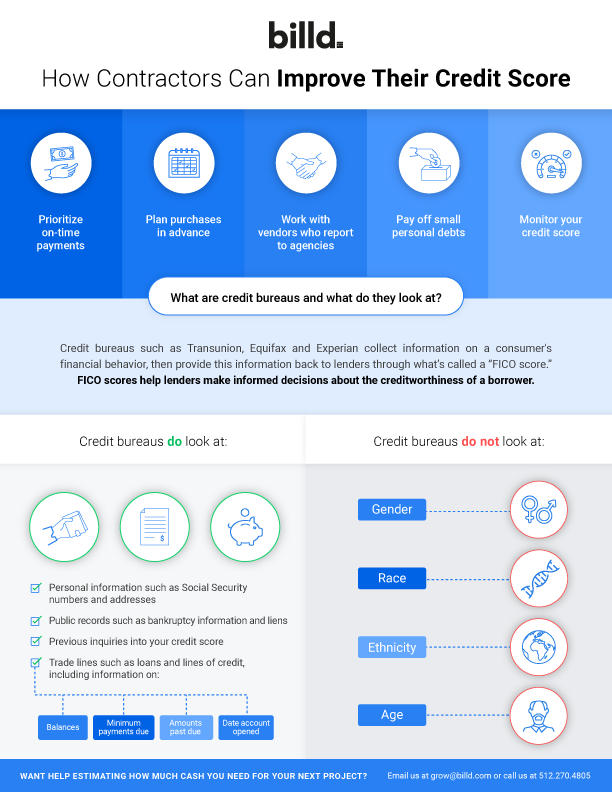In the construction industry, credit isn’t just an option — it’s a key component for growing your business. To take on bigger, more competitive projects, you must have access to financing as well as relationships with lenders willing to offer it. By pursuing a bank line of credit or other forms of financing, you can get the capital you need for your construction business and avoid the risk of slow payments and cash flow issues. These problems are all too common across the industry.
Your ability to obtain a business construction loan or a contractor line of credit from a bank depends on a variety of factors and things you’ll need to consider, including lender requirements, types of loans, and your contractor credit score.
Before we dive in, it’s important to understand that you should plan your financing options before you actually need it. By planning ahead, you put yourself in a position to get a contractor loan with favorable terms. If you wait until you need it, you’ll likely be in a position where your finances don’t look too great, and you may have trouble locking in financing. So, plan ahead and start building those relationships with lenders when times are good.
Let’s dive in, shall we?
Types Of Credit In the Construction Industry for Contractors
To make an informed decision about how to finance your construction business, you will first need to understand some of the common types of financing options available to contractors:
- Credit card: Just like a personal credit card, a business credit card allows you to spend up to a predetermined credit limit. For newer businesses with limited credit history, credit cards usually start with credit limits of around $5,000, which then increases as companies establish credit with their lender. Construction companies commonly use credit cards to purchase things like materials or equipment. However, many times the credit limit on a credit card is not high enough for the types of purchases a contractor needs to make.
- Bank line of credit: With this financing option, a bank or other financial institution agrees to lend a certain amount of capital to you. Over time, when you need the money, you can draw on the bank line of credit up to the maximum amount (known as the credit limit). You only pay interest on the money you’ve borrowed and that remains outstanding. Contractor lines of credit are there when you need some additional cushion, but tend to be secured loans in which you would not want to max it out. Commonly, bank lines of credit will require a blanket lien on the business, making it challenging to obtain other types of financing if you needed it.
- Project-based financing: Project-based loans for construction companies will fund specific parts of your project, usually either material or labor, and allow you to pay back the purchase over time. With this type of financing, the credit limits are more focused on the quality of the project rather than the credit worthiness of the business owner. A company like Billd offers project-based funding on material purchases.
- Supplier terms: Suppliers offer a form of financing through their in-house terms. Suppliers do not technically charge customers for terms, but the difference between the cash price they would offer and price with terms essentially translates to the finance charge. Terms with suppliers is a great option if you’ve built a strong relationship with mutual trust, and you’re consistently paid within 30 days of when you start a project. Otherwise, supplier terms do not tend to mirror construction payment cycles, and contractors often are required to pay their suppliers before they’ve been paid for a job.

What Affects Your Ability to Get A Contractor Loan?
Different lenders have different approval processes with varying degrees of time and qualifications. During the loan approval process, lenders will take a number of elements into consideration. The following factors play a role in determining whether you can get a contractor loan:
- Revenue: Lenders may ask you to provide proof of your business’s revenue by showing bank statements or supplying your business’s tax returns for the past few years. This is important in determining your debt to income ratio. If you’re a sole proprietor, this may come in the form of looking at your personal income and personal tax returns.
- Credit history: Your lender will also review your credit history. The terms of your contractor loan, and your ability to obtain the loan, will likely be impacted by the quality of your credit score. According to Equifax, Excellent scores range from 760-850, Very Good from 725-759, Good from 660-724, Fair from 560-659, Poor from 280-559. Often times, banks or credit unions will pull credit reports from the business owner to assess the business owner’s creditworthiness. Maintaining a strong personal credit score (FICO Score) is vital if you want to expand your access to financing.
- Outstanding debts: When reviewing your credit history, your lender will see any outstanding debts you have on other credit cards or loans. Lenders will look at what’s called your “credit utilization” which is a function of how much debt you have outstanding to the total amount of credit you’ve been issued. A low credit utilization is good, and indicates you are not tapping into, or maxing out, every credit line available to you.
- Project Details: For some types of contractor loans, lenders will ask for information on the project you’re working on, including your project’s contract or even quotes from your suppliers. Lenders may also do research on the property owners or GCs of the project at hand. The types of lenders more likely to look at this are project-based financing lenders, who place a high importance on the strength of your project.
- Down payment: Some lenders may also ask you to submit a down payment, which is typically between 20 and 25 percent of the loan. Down payments are not required for bank lines of credit or project based financing, but more for financing of large asset purchases such as trucks or large equipment.
- Size of the company: Depending on the type of loan you seek, the size of your company may impact your ability to get a loan, as well as the credit limit associated with your loan. If you are considering a loan backed by the U.S. Small Business Administration (SBA), for example, your business must meet the SBA’s size standards for a small business. For project-based financing lenders, the size of the company is important because it gives a rough estimate of how much material or labor you will need to pay on a yearly basis. If your construction business does $1 million per year in revenue, it’s fair to assume you may be purchasing about $300-$400k of materials. Requests well above that estimate could raise red flags to the lender.
- Delinquencies: Lenders may check if you have had any delinquencies on previous loans. If so, lenders may likely be less likely to issue you a new contractor loan.
- Bankruptcies: Lenders will surely look to see if you’ve had any bankruptcies in your past. It goes without saying that no bankruptcies are a good thing here.
If your company faces any of these hurdles, don’t be discouraged. There are several ways to improve your credit and strengthen your loan application.
Building Your Construction Company’s Credit
Your ability to get a contractor loan hinges on your company’s finances and credit history. If you need to build your company’s credit, focus on the following:
- Prioritize on-time payments: Your payment history has a significant impact on your credit score. Focus on making on-time, regular payments to any current bills and bank lines of credit. Additionally, focus on paying off loans from lenders that report back to the credit agencies.
- Plan your purchases in advance: Making a large purchase on a credit card can increase your utilization rate, which will likely lower your contractor credit score. By planning your purchases in advance (and ensuring you have the capital to quickly pay those debts off), you can raise your credit score.
- Work with vendors that report to the credit agencies and ensure timely payments: Some vendors allow you to purchase goods from suppliers and pay later — sometimes 30, 60, 90, or even 120 days later. Those vendors then report your payments to the three major commercial credit agencies, which can help your company build strong business credit. For example, Billd, which offers material purchase funding, reports back to the credit bureaus.
- Pay off small personal debts: Make sure to pay off any small personal debts. They can have an effect on your contractor credit score and compared to your business cash flow, they are minor. Don’t let a $1,000 collection change your business credit options.
- Monitor your business and personal credit scores: Be sure to keep your personal and business credit top of mind and monitor it frequently. If you see a drop, understand why. Make the necessary changes to bring it back up. You can monitor your credit scores directly on the credit bureaus, Equifax, Transunion, and Experian. Or, use a service like Lifelock, which notifies you of changes to your credit or when your credit is pulled, among other benefits.
Over time, these efforts can help your business establish a strong credit score, which can strengthen your contractor loan or credit application.
Ultimately, there are a number of financing options available to construction companies to help you get the funding you need to win bids, complete projects, maintain positive cash flow, and grow your business.
And that’s exactly why Billd was founded. Our payment solution was created for material purchasing. Through Billd, suppliers receive prompt payments, while contractors enjoy 120 days to pay, so you can avoid cash flow problems and keep your business on a growth trajectory.







